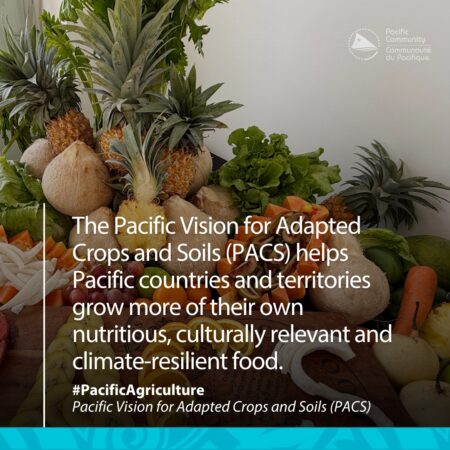Think you can help the Pacific make the most of its lesser-known crops? Apply for a cool job at SPC.
Nibbles: Restoration, Monitoring, CARDI, Margot Forde, Warwick, Slow Beans 2025, Lonicera
- Africa needs good forest seeds.
- And genetic monitoring of the resulting plantings, probably.
- The Caribbean also wants quality seed, and thinks a mobile seed bank is the way to get it.
- The only mobile things about New Zealand’s genebank are its collectors.
- A very mobile donation to the UK’s vegetable genebank.
- Nothing very mobile about Slow Beans 2025, but that’s the point.
- The long journey of honeysuckle.
Nibbles: Ukraine duplication, Mexican native maize, Andean agriculture double, Campanian crops double, Pacific cryobank, Moringa promotion
- A little more safety for Ukraine’s seeds, thanks to a new genebank.
- A little more safety for Mexico’s native maize, thanks to Pres. Sheinbaum.
- A little more safety for Andean agriculture, thanks to Ecuadorian Indigenous women and Inside Mater in Peru.
- A little more safety for Ischia’s zampognaro bean and Amalfi’s lemons, thanks to local people (and GIAHS).
- A little more safety for Pacific crops, thanks to cryopreservation. Breadfruit next?
- A little more safety for moringa? At least in Africa with all its “opportunity crops”?
Nibbles: Millennium Seed Bank 25th, NPGS, Maize germplasm, Breadfruit genebank, Banana genebank
- King Charles III talks about seeds with Dr Elinor Breman of Kew’s Millennium Seed Bank and…
- …Cate Blanchett.
- Or read about it in The Economist.
- Or watch a nice video.
- The seed banks of the National Plant Germplasm System in the USA are for farmers, not just researchers.
- How to get stuff out of the NPGS.
- Laurajean Lewis: from an NPGS genebank to CIMMYT’s.
- I’m sure she and Chris Mujjabi will get to know each other soon.
- Diane Ragone: Not all genebanks are seed banks.
- Not a lot of breadfruits in Belgium but, surprisingly, lots of bananas.
Those who cannot remember the history of NUS…
The European Commission has waded into the whole opportunity crops thing with its “Neglected and Underutilised Species (NUS): Potential for Food and Nutrition Security – a Knowledge Review.”
Only, as you can see, it’s not calling them opportunity crops, but rather opting to go retro with NUS, though there is a nice round-up of the diversity of the terminology:
There are different names in the literature related to neglected and underutilised species (NUS). Although they have a slightly different focus, they are often used interchangeably: indigenous and traditional food crops, orphan crops, forgotten foods/crops, minor crops, under-used/under-exploited crops, under-developed crops, promising crops, lost crops, alternative crops/food, traditional food crops, niche crops, future smart food, opportunity crops. In the humanitarian context, especially regarding the formulation of Ready to use therapeutic or supplement food (RUTF/RUSF), the term NUS is rarely used, while literature mainly refers to local crops.
There are also useful discussions of the drivers of neglect and underuse, and of the different benefits of NUS cultivation and consumption. The list of international initiatives is not comprehensive, but a good start. And genebanks get a name check…
To conserve and valorise genetic resources it is essential that NUS seeds are conserved in-situ (community seed banks) and ex-situ (gene banks). Additionally, genetic conservation measures should be designed, that also address the risk of over-exploitation when using wild plants. This requires a multifaceted approach, including local taxonomic research to better understand the species in question and a deeper insights on the genomes of ALV1. Further, detailed characterizations and assessments of NUS related to their benefits for resilience to climate change, cultural richness and sustainable livelihoods is needed.
Furthermore, it is important to intensify breeding programmes, develop adequate seed systems and measures for continuous quality seed production and distribution; and strengthen and upgrade smallholder seed systems. To promote sustainable use, it is recommended to engage farmers and grassroots movements in all domestication efforts. Furthermore, research should also focus on resilience to pests and diseases, modernising production methods, and addressing post-harvest inefficiencies.
…so what’s not to like?
Well, what I missed was some sort of indication that this is not exactly the first time we’ve been through this. Everything is thoroughly backed up with references (I’ve removed the citations from the excerpts above for clarity, but they’re there in the PDF). However, none of the publications listed is older than 2019. I hope we don’t repeat history. We had an International Centre for Underutilized Crops there for a while, after all. You all remember that, right?
LATER: There’s a webinar on the knowledge review on 15 October. Assuming they get the sign-up page working…
